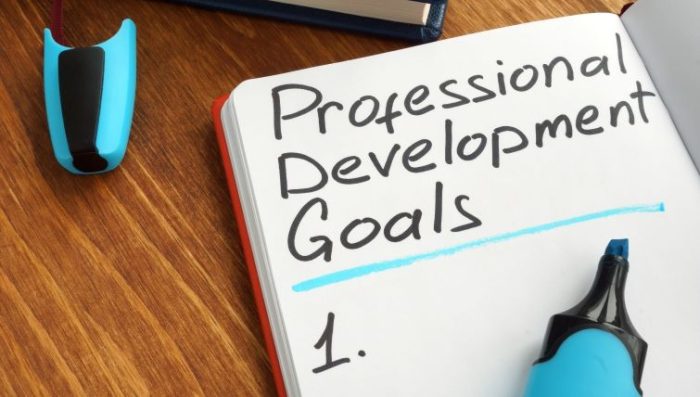What You Need To Know About Professional Development Goals
 Publié le 21 April 2023
Publié le 21 April 2023
Keep your career on a path to stability and success by understanding what you need to know about professional development goals.
Did you know over 95% of employees are looking for new jobs this year? For many, the main reason for their search is economic. They consider job-hopping as the best way to increase their salaries. Experts also say they have other vital considerations, such the ability to maintain a better work-life balance. But all these boil down to one thing—professional development.
When considering any career change, you must first set your professional development goals. You probably think about meeting your objectives as a full-time employee or building your career development plans as a remote worker. Whatever it is, start by defining your SMART goals for professional development.
But the question is: What goals should you set, and how can you achieve them? Read below to learn more about these.
What Are Professional Development Goals?
Professional development goals are specific objectives you set for yourself to advance your career by enhancing your knowledge and skills. These goals usually focus on improving your job performance or shifting to a new role. They often involve learning new skills, getting certified, and attending training sessions.
LinkedIn recently launched its 2023 Workplace Learning Report. This report reveals many insights about professional development and career growth that will guide both employees and their employers:
- Over 80% of learning and development (L&D) departments are helping. This means companies offering training programs aid employees in their career growth.
- Almost 90% of L&D professionals believe that proactively honing skills will help employees succeed in their future work. This means that employers should develop their employees’ skills relevant today and needed in the future.
- “Progress toward career goals” is the top motivation for workers to learn. This means that employees want to learn more to advance their careers.
But what makes professional development goals? You might have heard of the popular SMART goals: specific, measurable, achievable, relevant, and time-bound. Setting such goals proves effective in the world of business. So, make sure to define your SMART goals for professional development:
- Specific: Set clear and concise goals defining what you want to achieve. For instance, advancing your career is such a broad professional objective. Instead, ask yourself: Do you want to get promoted as a supervisor or change course and finally pursue your profession as a teacher?
- Measurable: Establish concrete criteria for measuring your progress toward your professional goal. For example, you might want to hit your sales target for the next few months before applying for a team-lead position.
- Achievable: Create realistic and attainable goals based on your skills, resources, and time constraints. Of course, you can’t expect to become the company’s next CEO a year after you were hired as an entry-level employee.
- Relevant: Align your goals with your personal and professional aspirations, even with your current job. You want to ensure they are related to your profession, passion, and interests.
- Time-bound: Set a timeline for the completion of your professional goals. For example, you aspire to become the number one sales agent by the end of the year.
Don’t know what SMART goals to set for your career? Consider the following professional development goals examples:
- To level up your credentials. You plan to get proper training and certifications to advance your professional status.
- To get promoted in your current company. You’ll work hard to be the top agent for six months so that you can apply for a supervisory position.
- To assume leadership roles. As you have been a consistent employee with a proven track record, you aspire to become part of the management team.
- To materialize your side hustles. You want to leverage your knowledge and skills to grow your career as a professional.
- To shift to another fulfilling career. You want to start a different career to find fulfillment outside the four walls of an office.
- To expand your professional network. You want to connect with other professionals and businesses to build your career.
- To grow your financial resources. You plan to invest in a 401(k) plan or your RRSP. When you retire from work, you’ll be financially stable.
- To get your much-coveted dream job. You finally want to leave a job that only pays your bills. This time, you want to pursue your dream.
At this point, you might be wondering why there is a need to set professional development goals to advance your career. Doing so will help you achieve the following benefits:
- Enhanced Knowledge: Setting these goals allows you to acquire new knowledge and skills relevant to your field. That can give you expertise for career growth and advancement.
- Developed Skills: Your goals will compel you to take training programs and earn certifications. They will help you acquire new skills and develop your existing ones to become a more competent professional.
- High-level Expertise: Continuously pursuing professional development goals can lead to high-level expertise in your niche. That can translate to a leadership role, higher pay, and industry recognition.
- Career Growth: Professional development goals can be a top driver of career growth. They will help you advance in your current organization or transition to a new role or industry.
- Professional fulfillment: Setting professional development goals can help you find greater meaning and purpose in your work. Why? It allows you to pursue your passion and develop the skills you need for your interest.
- Financial Stability: Pursuing professional development goals can lead to increased financial stability. You’ll develop new skills or knowledge that can lead to promotion, higher pay, or a new job.
How To Set Your Professional Development Goals
Understanding what you need to know about professional development goals is crucial to achieving your long-term career aspirations. However, it takes a deliberate thought process and careful planning to set them in place.
Unfortunately, it’s easier said than done. You probably don’t know where to start and how to set SMART goals that will make your dream job come true.
Follow these crucial steps for setting your professional development goals .
1. Examine your current professional status
Before setting goals and working on strategies, check your current professional status first. A thorough and honest self-examination is needed to assess your knowledge, skills, experience, and qualifications. Then, ask yourself: Where are you in your career, and how far is it from your ultimate goal?
First, you can check and review your resume, job descriptions, and performance evaluations. You can also ask for feedback from colleagues, mentors, and supervisors to have a more objective perspective. Ultimately, your goal is to identify areas where you excel and where you need to improve. That will help you set meaningful professional goals!
2. Think about what you want to achieve
After self-evaluating your current professional status, you can now think about what you want to achieve in your career. Are you looking to undergo training, earn professional certification, or enhance your education? Are you looking to advance in your current role, transition to a new field, or start your own business?
All these questions are valid. They will allow you to achieve those career development goals examples above. Remember, you must think of things first before you can actualize them. Understanding your career dreams and aspirations will help you set your SMART goals.
3. Write short- and long-term goals
It’s one thing to contemplate your dreams; It’s another to set realistic goals. After thinking about what you want to achieve, it’s time to get your pen and write down your professional objectives. You can categorize them into two types: short-term and long-term. Establishing both will help you create SMART goals for professional development.
Short-term goals are usually achievable within a year. For example, you want to attend a workshop, take career test preparation courses, or seek mentorship. Meanwhile, long-term goals usually take much longer and as a result can be very ambitious. For instance, you plan to assume a leadership position or start a business one day. If unsure, consider some of the professional development goals examples above.
4. Set a path toward your goals
After writing down your goals, now is the time to establish a better career path. First, break down your goals into smaller, more manageable steps. Then, create a plan for accomplishing each step. That’s where your professional development strategies come into play.
Suppose you plan to get promoted as a supervisor. In that case, ensure consistent performance for the next few months. You should also collaborate with your current team and establish good relationships with the management. Plus, you should seek mentorship and sharpen essential skills to further your career. All these steps will lead you to your ultimate goal!
5. Track your performance
The final step requires you to evaluate your progress and measure success. First, set specific metrics for measuring success, like the number of training programs attended and courses completed. You can also get feedback from colleagues or mentors to better understand your current standing. Finally, work towards improving your overall performance.
Furthermore, celebrate your small wins along the way. Document your professional success and tick off those career development goals examples listed. Recognizing your achievements will motivate and inspire you to even achieve greater goals. Who knows? You’ll finally make your dream job come true!
Final Words
Understanding what you need to know about professional development goals is crucial to your career growth and overall success. By setting some for yourself and working to achieve them, you can stay competitive, successful, and fulfilled in your career.
Whether you plan to advance to a higher role or shift to a new job, taking a proactive approach to your career can pay off in the long run. Consider the crucial steps for setting your goals discussed above.
Goal-setting is and will always be the first step in your professional endeavor. What you need to know about your professional development goals is that with the right mindset and strategies, you can take your career to the next level!







